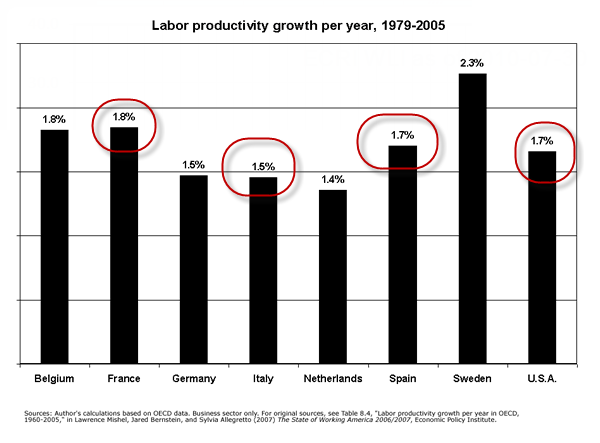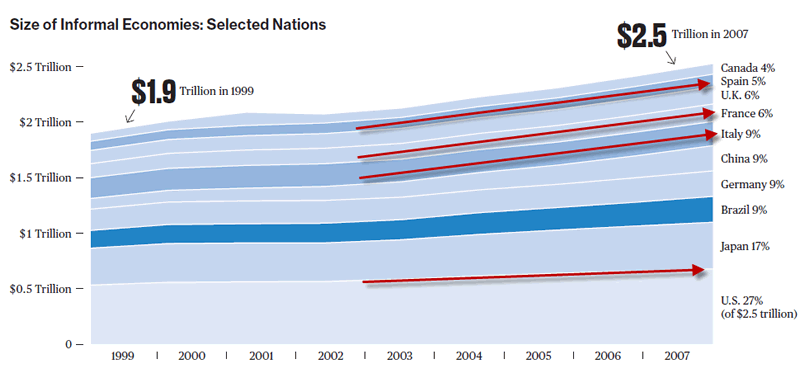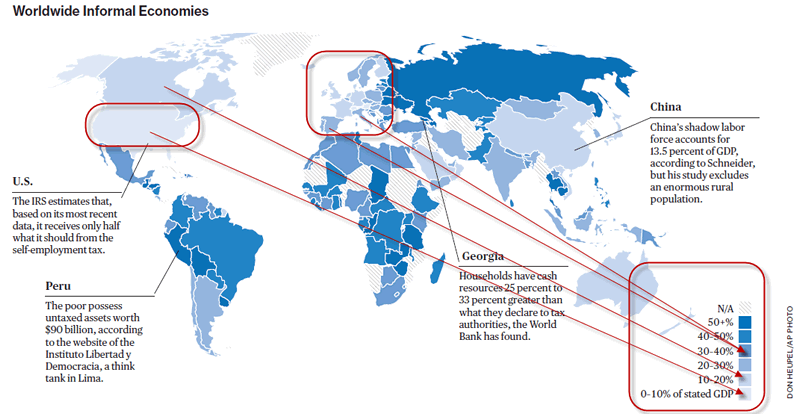Naked Capitalism Temporary Insanity Defending Unions, Blog Wars?
Economics / Employment Aug 02, 2010 - 06:03 PM GMTBy: Mike_Shedlock
 I remain in awe of how people who can think clearly most of the time, occasionally stray off the deep end defending socialist idiocy. This is one of those times.
I remain in awe of how people who can think clearly most of the time, occasionally stray off the deep end defending socialist idiocy. This is one of those times.
For some inexplicable reason Yves Smith at Naked Capitalism has chosen to re-post Summer Rerun: Debunking the Notion that Unions Hurt Productivity
The post first appeared on June 23, 2007. The article was ludicrous then. It is far more ludicrous now.
The essence of the article, is "A neat little analysis by Ross Eisenbrey at the Economic Policy Institute may be difficult for union foes to explain away."
Here is a chart that supposedly proves unions do not decrease productivity.
Labor Productivity

There is a common myth that unions hurt productivity, supposedly because they impose work rules that make their employers less efficient. The evidence from industrial relations studies does not support this myth. A broad study of the economics literature found “a positive association [of unions on productivity] is established for the United States in general and for U.S. manufacturing” in particular (Doucouliagos and Laroche 2003, 1).1 And as the second chart below reveals, international comparisons suggest that high productivity and very high union density are entirely compatible.
The above chart, cited by Naked Capitalism, is courtesy of Strong unions, strong productivity by the Economic Policy Institute.
Four Problems
1. There is no starting point.
2. Correlation is not the same as causation.
3. Common sense
4. The analysis ignores the unseen costs of unions
No Starting Point
Assuming one believes the above chart (I don't) I would like to point out that the variances do not seem that significant. More importantly, they do not reflect changes over time.
For example: Public union excesses in the US have gone rampant. We keep getting less and less services for taxpayer dollars in the US. Public union salaries and benefits are clearly at the heart of it.
Correlation is Not Causation
The rooster crows at dawn and the sun comes up. It is of course preposterous to assume the sun comes up because the rooster crows. One might as well say that because newspaper circulation went down and productivity up, that newspaper circulation inversely affects productivity. Clearly that is preposterous.
Let's assume one believes in the productivity of German workers. I do. Why not? Is that because of unions or in spite of unions?
Here is an indisputable point of fact: Unions have wrecked Greece, Spain, and the UK. Greece is a certifiable basket case because of public unions.
Thus, the idea that presumed productivity increases relative to the US are preposterous.
Common Sense
I am a proud supporter of common sense. I believe you can lead a horse to water but not make him drink.
With that in mind, I suggest it is preposterous to think that union rules do not affect productivity. For a case in point: Conventions Say Good Riddance to Chicago Over Costs and Union Work Rules.
The work rules in question mean that exhibitors need an "electrician" to plug in their computer. They need union workers to setup their exhibit. The list goes on and on.
In response to union work rules and their costs, conventions left Chicago in droves for Las Vegas, Miami, and other places. Recently, Chicago has changed its union work rules in an attempt to lure back customers with some success and ironically with idiotic unions kicking and screaming every step of the way.
Even if you are foolish enough to think such insanity is not a detriment to productivity, it does increase costs. Given that increased prices of goods and services are reflected in GDP, and given that unions increase prices of goods and services, it is ludicrous to state that relative country-to-country GDP measurement is proof of the benefits of unions.
Moreover, it is silly to believe any of these GDP measurements (of any country) in the first place. Ironically, Yves Smith used my analysis regarding US hedonic adjustments to GDP to support her position.
Yes, US GDP is overstated. Arguably every country's GDP is overstated and/or not reflective of what is happening and why.
Unseen Costs of Unions
Whether or not you are convinced that unions decrease productivity, it is not debatable that unions increase costs. GM went bankrupt over union costs. More importantly, Greece is bankrupt over public unions, California is bankrupt over union salaries and pension benefits, and so is Illinois.
Of course Oakland, East St. Louis, Detroit, Houston, Los Angeles, and numerous other cities are technically bankrupt over union salaries and pension promises that cannot be met.
Right to Strike
In a 1964 issue of Christian Economics Ludwig von Mises wrote:
“What is today euphemistically called the right to strike is in fact the right of striking workers, by recourse to violence, to prevent people who want to work from working. This means that the authorities have surrendered to the unions an essential attribute of their governmental functions . . . . If a union succeeds in forcing the employers to pay higher wage rates than those they were prepared to pay under the prevailing state of market conditions, this is not a victory for “labor” . . . . It is a boon only for those workers who will be employed at the new rates. It is a calamity for all those whom it condemns to lasting unemployment.”
Gratefully Mises considers the seen and the unseen of public union salaries. The direct result of higher salaries for public unions is taxes go up to support the unions and unemployment rises as well.
Complete fools might argue that wages across the board should go up and that everyone should get the same benefits. However, this would further encourage job flight to Asia on account of global wage arbitrage.
Collapse in Global Trade
Some propose tariffs as the solution to keeping wages up. Those economic illiterates forget what the Smoot Hawley act did to global trade in the Great Depression.
Even ignoring tariffs, the chances of a collapse in global trade are very real. I recently discussed the idea of a collapse in global trade in Should China Dump Dollars for Commodities? What about the "Nuclear Option" of Dumping Treasuries? Can Global Trade Collapse?
If something like Smoot-Hawley is passed again, the odds of a global trade collapse approach 100%.
Off the Books
The key point now is that every conceivable argument supporting unions has been thoroughly trounced.
Yet, I still have not finished with the trouncing.
Please consider Is Italy Too Italian?
Since the economic crisis began, [Italy] has regularly turned up on the informal list of Nations That Worry Europe. While its finances are not as precarious as those of Greece, Portugal or Ireland, because it is far larger — the Italian economy is the seventh largest in the world — its troubles are more frightening. As a recent report by UniCredit, a European banking group, put it, Italy is “the swing factor” in the crisis, “the largest of the vulnerable countries, and most vulnerable of the large.”
FIVE years ago, Francesco Giavazzi needed a taxi. Cabs are relatively scarce in Milan, especially at 5 a.m., when he wanted to head to the airport, so he called a company at 4:30 to schedule a pickup. But when he climbed into the cab half an hour later, he discovered that the meter had been running for more than 20 minutes, because the taxi driver had arrived soon after the call and started charging for his time. Allowed by the rules, but to Mr. Giavazzi, utterly unfair.
“So it was 20 euros before we started the trip to the airport,” recalls Mr. Giavazzi, who is an economics professor at Bocconi University. “I said, ‘This is impossible.’ ”
Professor Giavazzi later wrote an op-ed article denouncing this episode as another example of the toll exacted by Italy’s innumerable guilds, known by several names here, including “associazioni di categoria.” (These are different from unions, another force here, in that guilds are made up of independent players in a trade or profession who have joined to keep outsiders out and maintain standards, as opposed to representing employees in negotiations with management, as a union might.) Even baby sitters have associations in Italy.
The op-ed did not endear Professor Giavazzi to the city’s cab drivers. They pinned leaflets with his name and address at taxi stands around Milan and for the next five nights, cabs drove around his home, honking their horns.
“This is a country with a lot of rents,” says Professor Giavazzi, sitting in his office one recent afternoon, using the economists’ term for excess profits that flow to a business because of a lack of competition. “You need a notary public, it’s like 1,000 euros before you even open your mouth. If you’re a notary public in this country, you live like a king.
THE protectionist impulses of the guilds are mimicked throughout the Italian labor market. The rules are different for small companies, but in effect, people with a full-time job in a company with more than 18 workers have what amounts to tenure, even if they don’t belong to a union. This makes managers reluctant to hire, especially in a downturn. You are stuck with new employees in perpetuity, whether they’re good or not.
So how does Italy keep going? Given the numbers, you expect it to be flat on its back. But when you visit, there are hardly any signs of despair, even in Biella, where hundreds of factories and warehouses have closed in the last decade. Why?
One answer is the black economy, say economists. Roughly one-quarter of Italy’s G.D.P. is off the books.Underground "Shadow Economy" Accounts for 35% of World GDP
One reason productivity might seem higher in some countries is that in highly unionized and highly regulated economies, many transactions are "off the books". Businesses and consumers are willing to do anything to avoid government regulation, union rules, etc.
Please consider a timely Bloomberg article The Underground Economy.
The global shadow economy—activity that isn’t necessarily illegal but goes unreported—amounts to almost 35 percent of the world’s official GDP, according to Friedrich Schneider, a professor at the University of Linz in Austria and an authority on the topic. In a June report, Schneider examines informal economies, which range from 9 percent of GDP in the U.S. to more than 70 percent in Bolivia and Georgia. The report takes into account such activities as undocumented immigrant labor, home businsses, and freelancing that escape the attention of tax authorities. It doesn’t cover drug trafficking and other criminal enterprises.
Size of Informal Economies
The interesting thing to me is not the size of the underground economy, but the growth rate of the underground economy.
Worldwide Shadow Economies
Correlation is not causation, but seriously, does anyone think that avoidance of government regulations and union work rules is not at the heart of those charts?
Protecting Incomes
The Economic Policy Institute concludes...
If Congress is concerned about protecting middle-class incomes, it should pass measures to facilitate union organizing and collective bargaining coverage, including the Employee Free Choice Act. There is no reason to fear that higher rates of unionization will impede efficiency or labor productivity.
The idea that we can protect middle-class incomes by taxing everyone to death to support public union workers is sheer insanity.
Why Yves would bother to post such idiocy in the first place is beyond me. The repost in light of enormous public union problems, clearly bankrupting cities and states is even more puzzling.
Yet Yves wrote "Maybe more unions are just the thing we need……"
No Yves, more unions are 100% without a doubt the last thing we need. Public union pensions are a minimum of $2-3 trillion underfunded and taxpayers are currently liable. Public unions wrecked Greece, California, Illinois, New Jersey, nearly all the states, and countless cities. The damage will take decades to fix. We need to get rid of public unions completely to get this nation back on track.
Blog Wars?
By the way, this is not an attack on Yves or the start of a blog war. I have had disagreements with many people I respect including Calculated Risk, Barry Ritholtz, Michel Pettis, and Nouriel Roubini. More often than not, those disagreements are not on what is happening, but rather the cures for what ails us. In this case, given that unions are without a doubt one of the key problems, it is axiomatic that more unions is not the solution.
By Mike "Mish" Shedlock
http://globaleconomicanalysis.blogspot.com
Click Here To Scroll Thru My Recent Post List
Mike Shedlock / Mish is a registered investment advisor representative for SitkaPacific Capital Management . Sitka Pacific is an asset management firm whose goal is strong performance and low volatility, regardless of market direction.
Visit Sitka Pacific's Account Management Page to learn more about wealth management and capital preservation strategies of Sitka Pacific.
I do weekly podcasts every Thursday on HoweStreet and a brief 7 minute segment on Saturday on CKNW AM 980 in Vancouver.
When not writing about stocks or the economy I spends a great deal of time on photography and in the garden. I have over 80 magazine and book cover credits. Some of my Wisconsin and gardening images can be seen at MichaelShedlock.com .
© 2010 Mike Shedlock, All Rights Reserved.
© 2005-2022 http://www.MarketOracle.co.uk - The Market Oracle is a FREE Daily Financial Markets Analysis & Forecasting online publication.





